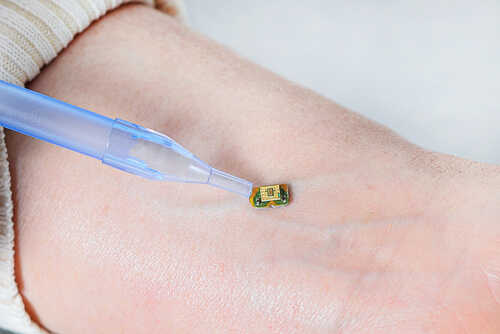
(NewsGlobal.com)- More than 50,000 individuals today have chosen to have a subdermal chip surgically implanted between the thumb and index finger to act as their new swipe key or credit card. One guy even used it to hold a link to his last will and testament in Germany, where more than 2,000 Germans have chosen to get similar implants.
Worldwide interest is growing in the novelty of replacing one’s “home key” with a microchip implant.
In a 2021 consumer poll conducted in the United Kingdom by Propeller Insights on trends in digital payments in Europe, 51% of the 2,000 respondents would consider obtaining a chip implant to pay for services. Sweden is one of the most popular cashless payment options. 1 in 4 Swedes spends cash at least once a week. For use as e-tickets for train travel and to preserve emergency contact information, more than 4,000 Swedes have switched from keycards to chip implants.
The Internet of Things (IoT), a growing digital universe of wirelessly linked, internet-enabled gadgets, includes various developing technologies, chip implants being just one of them. But some IT experts are concerned that hackers who target IoT flaws in sensors and network design may also attempt to hack chip implants.
RFID chips are transponders used for identification that generally have a unique identification number and may be tagged with user data, including financial information, social media accounts, and health records.
Because RFID chips are passive transponders, communication with the user’s microchipped hand requires the digital reader to be a few inches away. In contrast, near-field communication (NFC) chips, such as those in smartphones and contactless credit cards, employ electromagnetic radio waves to connect with digital readers nearby wirelessly. International usage is one advantage NFC has over RFID, as stated by Biohax: “A significant advantage of ours is that we overlap nearly any corporate or public sector currently utilizing NFC or mobile tech, thanks to the strength of existing infrastructure and the broad range of services and goods already supporting the NFC standard internationally.”
Chip implants will have a more significant impact and influence in the United States, raising complicated issues for state legislatures and courts to address, such as third-party liability for cybersecurity, data ownership rights, Fourth Amendment rights of Americans, and the protection of sensitive digital data under the Carpenter v. United States decision of the Supreme Court from 2018. At least ten state legislatures in the US have approved laws prohibiting businesses from mandating that workers have human microchip implants.
Legislators must be aware of the fine line between preserving the flame of technology innovation and development and safeguarding it from misuse and abuse. Technology is neither good nor harmful nor neutral, as highlighted by technology historian Melvin Kranzberg.













